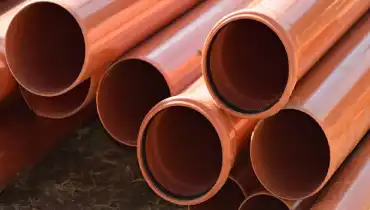
Many of the earliest plumbing systems were comprised of clay sewer pipes. With the availability of more modern pipe materials today, does clay hold up, or is it ancient history? You decide.
Clay Sewer Pipe History
The first known example of when clay pipes were used for plumbing dates back to 4000 BCE in Babylonia. This is often considered the birthplace of urban plumbing.
Another ancient example is the city of Ephesus on the west coast of Turkey. Between about 2000 and 1000 BCE, houses and other buildings sprang up, turning Ephesus into a bustling city. Homes in the rich areas of town enjoyed hot and cold running water through clay pipes.
Clay remained a popular material for city plumbing and drainage systems through the early 1900s. Manufacturing plants popped up in towns wherever there was a need for plumbing and an adequate supply of clay to use as a raw material.
Where are Clay Pipes Used Today?
Modern vitrified clay sewer pipes are air-dried for 24 hours and then fired in a kiln for 50 hours, creating a ceramic-like end product. This material also referred to as terra cotta, is stronger and fits together more tightly than older clay plumbing. It’s still routinely used in public sewer systems today. Modern installations include encasing the clay pipes in concrete to protect against root intrusion and damage from ground shifting.
You might be surprised to learn that some still-functioning clay pipe systems in America were installed over 100 years ago. There are even some ancient plumbing systems that continue to operate, like the one in Ephesus. This gives you an idea of just how long clay sewer pipes last! Still, whenever these pipes fail, they are quickly replaced with more reliable materials.
Pros & Cons of Clay Sewer Pipes Moving Forward
Clay is an ancient substance, but in many ways, it still holds up against modern plumbing materials. But ask any plumber about clay pipes, and they’ll tell you it has some serious drawbacks that make them inappropriate for many applications.
Pros of Clay Sewer Pipes
- Environmentally friendly: Made from recycled clay, water, and other organic ingredients, there’s no “greener” plumbing product than clay.
- Unaffected by acids: As opposed to cast iron pipes that degrade when exposed to acids, clay is impervious to the corrosive nature of acidic wastewater. This is one reason why clay pipes, if not affected by tree roots and ground shifting, can last for thousands of years.
Cons of Clay Sewer Pipes
- Hard to work with: PVC is much easier to handle, with its lightweight and smooth surfaces that connect easily and securely.
- Difficult to transport: Clay is incredibly heavy, which is why many cities in the 19th and 20th centuries had their own pipe manufacturing plants. Today, clay plumbing requires heavy-duty transport vehicles and incurs expensive shipping costs for this reason.
- Susceptible to root intrusion and leaks: Tiny tree roots can enter loose clay plumbing joints, growing bigger and breaking away the clay as time goes by. Old, crumbling clay pipes can result in expensive sewer repairs.
- Low tensile strength: The high compressive strength of clay makes it difficult to crush, but it has low tensile strength, which means it will snap under extreme pressure. To prevent this, clay sewer pipe should ideally be encased in concrete, but this increases installation time and cost.
Whether you need to install plumbing in a new house or your historic clay pipes have become root-infested, let Mr. Rooter Plumbing provide our professional recommendation on how to proceed. We’ll make sure your plumbing system is built to last.

